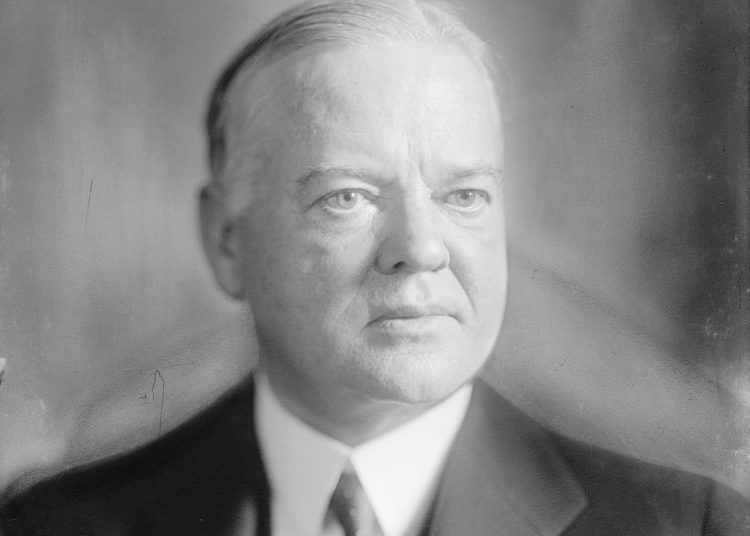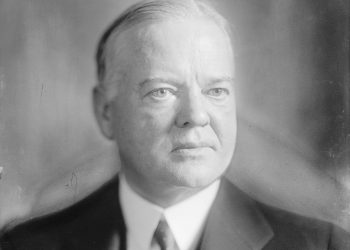Recently, C-SPAN released its 2021 Presidential Rankings Survey and President Herbert Hoover was ranked near the bottom. Hoover’s poor ranking is no surprise as he is often viewed as a failure or below average.
“It is one of history’s cruelest ironies that Herbert Hoover, an internationally successful mining engineer, the head of unprecedented food relief operations that saved millions of lives in Europe during and after World War I, our 31st President following a landslide victory, and an eloquent critic of collectivism of the New Deal and modern liberalism, is described in most of our history books as an archvillain personally responsible for the Great Depression of the 1930s that put 25 percent of America out of work and produced a thousand shantytowns of the homeless popularly (and unfairly) known as ‘Hoovervilles,’ wrote Edwin J. Feulner, who is the former President and founder of The Heritage Foundation.
However, Hoover deserves better. Today, August 10th, marks Herbert Hoover’s 147th birthday. Hoover was born in 1874 in the small quiet village of West Branch, Iowa. The “Chief,” as he was referred to by his friends, serves as an example of an individual who was dedicated to public service and strongly believed in American exceptionalism.
Growing up he was shaped by his Quaker upbringing. Orphaned at a young age he went to live with an uncle in Oregon and eventually he enrolled at Stanford where he graduated with a degree in geology. Hoover’s values were shaped by moral virtue, service, and a relentless work ethic. Hoover’s view of the United States as an exceptional nation also shaped his philosophy. Hoover applied his abilities in the field of mining engineering, and he soon became known as the “Great Engineer” as his successful mining career took him to several continents and gained him considerable wealth.
On the eve of the Great War (World War I), Hoover was working in England and when the war began, he soon found himself on the “slippery slope of public life.” During the war, Hoover organized the Commission for the Relief of Belgium, which based upon private initiative, was able to feed a countless number of people who faced mass starvation. Hoover’s service, which “fed war-torn Europe during and after World War I,” earned him the title of the “Great Humanitarian.”
Richard Norton Smith and Timothy Walch, both historians and Hoover scholars, wrote that Hoover “developed a unique philosophy — one balancing responsibility for the welfare of others with an unshakable faith in free enterprise and dynamic individualism.”
Hoover’s role as a public humanitarian continued with his leadership of the American Relief Administration, which provided food to the famine-stricken Soviet Union in the aftermath of WWI. Hoover opposed communism and even recognition of the Soviet Union, but he had compassion for those who were suffering. As Secretary of Commerce under President Calvin Coolidge, Hoover marshaled a private-sector response to bring relief and aid to the devastating Mississippi River flood of 1927. President Harry S. Truman, who developed a friendship with Hoover, called him back to service to provide humanitarian and food relief in the aftermath of World War II.
Herbert Hoover’s philanthropy also extended within the United States. Both Hoover and his wife, Lou Henry Hoover, were known for their generosity, which most of the time was done secretly. George H. Nash, a leading Hoover scholar and biographer, wrote:
“Hoover practiced the philanthropic virtues that he professed. As President, he declined to spend any of his salary on himself. Instead, he gave it away to charities or as income supplements to his associates. During their long marriage, he and his wife extended charitable assistance to countless needy recipients, usually anonymously and through surrogates. In the 1930s, Hoover’s brother concluded that he [Hoover] had given away more than half of his business profits for benevolent purposes. Characteristically, however, Hoover concealed most of his benefactions, with the result that their full extent may never be known.”
Hoover also left a legacy as a champion of American conservatism. In addressing his contributions to public service Richard Norton Smith wrote that “none has more relevance to our own time than Hoover’s role as a philosopher of modern conservative thought.” As Secretary of Commerce during the presidential administrations of Warren G. Harding and Calvin Coolidge, Hoover was viewed as a progressive Republican, which was accurate in comparison to some of his colleagues such as Secretary of the Treasury Andrew Mellon.
Nevertheless, Hoover’s political philosophy would impact modern American conservatism during the 1930s. In response to President Franklin D. Roosevelt’s New Deal, Hoover became the leading conservative voice against New Deal liberalism. This influenced conservative political leaders such as Ohio’s Senator Robert A. Taft and Arizona’s Senator Barry Goldwater.
Hoover also supported numerous conservative causes and organizations. As an example, he was an early supporter of William F. Buckley’s National Review magazine. Perhaps most important was his creating and funding of the Hoover Institution on War, Revolution, and Peace at Stanford University. During the Great War Hoover and his associates collected numerous documents and other resources related to not only the cause of the War but also various ideologies such as communism. It was these documents that started the vast archival collections. The Hoover Institution is not only a leading archive but also a prominent public policy think tank.
Historians will continue to debate Hoover’s legacy and people may disagree with his political philosophy and how he confronted the Great Depression, but Hoover led a remarkable life that was based upon public service, humanitarianism, and a belief that America is an exceptional nation. Feulner is correct when he wrote that “Hoover was one of the most remarkable Americans of the 20th century.”














